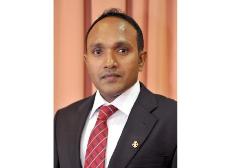Minister of Home Affairs Umar Naseer stated on Monday night that he had granted an order to police to remove any material which could be interpreted as “inciting hatred towards police”.
“I have notified every police officer and police station in the country of this order. I have ordered the removal of any material that may incite hatred towards the police – whether it is text, a drawing, a poster or a billboard – that is found in any area of the Maldives at any time.”
The Home Minister’s announcement was made during an event held in honour of retired Commissioner of Police Abdulla Riyaz, who has left the services to pursue a political career.
“For a long time now, there have been attempts of different levels to ruin the reputation of the police force and to create hatred amongst the public for this institution. This is something that has been done in other countries too. But the thing is, peace and stability have never been established in such countries,” Umar said.
Umar pledged to make the police force an institution which is loved and respected by all citizens.
Calling on educated youth to join the police forces, the Home Minister said that it is through employing young, capable, educated persons that the police force can be further strengthened and developed.
The Home Minister further pledged to “destroy gateways through which drugs are brought into the country”, as well as to eradicate all such networks.
The biggest problem faced by the Maldivian society is the issue of drug abuse, he suggested, stating that he had already begun to take necessary measures to eradicate such networks in the near future.
He promised that the police would play a huge role in the operation, and opined that it would be near impossible to bring down other crime levels without first handling the issue of illicit drug sale and abuse.
“We are coming out on a war against the issue of drugs. I hope we will get your full cooperation in these efforts. We will completely destroy drug trade networks,” he told the gathered officers.
Newly appointed Commissioner of Police Hussain Waheed, meanwhile, advised the police to speak “gently and caringly” when addressing citizens, and to maintain equal treatment to everyone.
He then said that police should become an entity which rids the community of the currently spreading “hatred and discord”, and that is should aim to bring back unity amongst the people.
“Aim to enforce law, not gaining popularity”: VP Jameel tells police
 During the same event last night, Vice President Dr Mohamed Jameel Ahmed stated that the police’s primary objective should be to ensure that they impartially enforce law, rather than whether or not they are garnering support and popularity.
During the same event last night, Vice President Dr Mohamed Jameel Ahmed stated that the police’s primary objective should be to ensure that they impartially enforce law, rather than whether or not they are garnering support and popularity.
Jameel stated that there are complaints that some of the police stationed in atolls work differently from the norms, saying that this leads to public disapproval and gives rise to concerns. He said that there should be no discrimination in the enforcement of law.
“Those who are mandated to enforce the law must not question the fundamentals of the law itself. Police must not question the substance of a law. It is not the police who decides whether or not the substance of a given law is solid. The law is already passed, and the police’s duty is only to enforce it,” Jameel said.
“If the citizens are being disturbed due to a loud speaker, you must be able to stop the loud speaker. If citizens are getting harassed on the street in a manner that disturbs them, and there is a law banning such action, you should be able to stop it. If there are laws made to assist the people, the police must be able to enforce it. I hope you will work in that manner,” he stated.
Jameel said that, although at a low level, it had previously come to his notice that police officers had acted on their own accord in certain cases, despite actions to be taken being specifically stated in law. He said that such actions had inhibited the growth and development of the institution.
He added that it was only when crime rates go down and stability is maintained that the police can be considered as having fulfilled their mandate to its fullest. He further called on the police to help the government implement a social protection system, saying that one of the strongest pleas of the public is to remove the political polarisation and to establish unity and oneness among the people.
 Commissioner Riyaz briefed the Gang Task Force on Wednesday, following his comments to local media the previous day.
Commissioner Riyaz briefed the Gang Task Force on Wednesday, following his comments to local media the previous day.